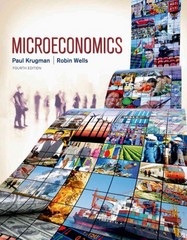Question
1.1 If there is a positive demand shock and a negative supply shock, the equilibrium quantity will: A. The answer cannot be determined B. Decrease
1.1 If there is a positive demand shock and a negative supply shock, the
equilibrium quantity will:
A. The answer cannot be determined
B. Decrease
C. Increase
D. Remain the same
1.2 The absolute value of the price elasticity of demand as we move along larger
quantities and smaller prices in a linear demand curve is:
A. The answer cannot be determined
B. Constant
C. Increasing on quantity
D. Decreasing on quantity
1.3 Suppose the equilibrium price for consumers in a given market is $1.
At this equilibrium, the elasticity of demand is -2 and the elasticity of supply is 5.
The government then introduces a 50 cent tax on consumers. The new equilibrium
price for consumers is:
A. $1.50
B. We don't know exactly, but it is more than $12
C. We don't know exactly, but it is less than $12
D. The answer cannot be determined
1.4 The demand curve for an inferior good is:
A. Upward Sloping
B. Downward Sloping
C. Upward or Downward Sloping
1.5 If a monopolist is currently producing at an output level at which the absolute
value of the price elasticity of demand is smaller than 1,
it can make more profits by producing:
A. The answer cannot be determined
B. Slightly more
C. Slightly less
D. None. The monopolist is already maximizing profits.
1.6 If a firm is earning a negative profit, it is always optimal for the firm in
the short run to:
A. The answer cannot be determined
B. Keep producing
C. Shut down
1.7 Jane is working, consuming, and saving rationally for retirement. A rise in
real interest rates will definitely lead Jane to save:
A. More
B. Less
C. Uncertain
D. The same
1.8 If the production function f ( K, L) exhibits decreasing returns to scale, then
the production function g (K, L) = sqrt [f (K, L)] exhibits:
A. increasing returns to scale
B. constant returns to scale
C. decreasing returns to scale
D. The answer cannot be determined
1.9 In a competitive constant-cost industry with identical firms and free entry, the long-run producer surplus is:
A. The answer cannot be determined
B. Lower than zero
C. Greater than zero
D. Zero
1.10 In a competitive constant cost industry with identical firms and free entry,
the long-run supply is:
A. The answer cannot be determined
B. perfectly inelastic
C. perfectly elastic
D. downward sloping
1.11 Firms A and B produce and sell a good in the same perfectly competitive
market.
Firm A has a higher short run cost than Firm B, and both are producing positive
amounts. In this case:
A. Firms A and B charge the same price
B. Firm A charges a higher price in equilibrium
C. Firm B charges a higher price in equilibrium
1.12 Fill in the blanks: Total industry output in Cournot Competition is ____ than
in monopoly, but ____ than in perfect competition.
A. (Greater, Greater)
B. (Greater, Lower)
C. (Lower, Lower)
D. (Lower, Greater)
1.13 A bond costs $100 up front and pays a return of $5 per year forever. If
interest rates rise, the bond price:
A. The answer cannot be determined
B. Stays the same
C. Decreases
D. Increases
1.14 A rational consumer that buys an actuarially unfair insurance policy (that is,
a policy where the premium exceeds the expected loss) is:
A. No rational consumer would by an actuarially unfair insurance policy
B. Risk loving
C. Risk averse
D. Risk neutral
Step by Step Solution
There are 3 Steps involved in it
Step: 1

Get Instant Access to Expert-Tailored Solutions
See step-by-step solutions with expert insights and AI powered tools for academic success
Step: 2

Step: 3

Ace Your Homework with AI
Get the answers you need in no time with our AI-driven, step-by-step assistance
Get Started


